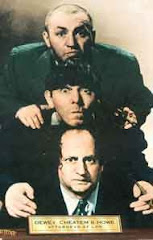I'm no economist. Well, at least not any sort of formal economist - I am a consumer, which may be at least as important. Here's my proposition for fixing healthcare. It will be roundly criticized by all the important players, for a number of reasons. Government will hate it, because it requires that government butt-out, for a change. Insurance companies will hate it because it will deprive them of the ability to continue charging people ridiculous premiums, then not paying for anything. The public will probably hate it, too. They won't really have a good reason to, but they'll be told to hate it by the people who are the paid servants of either the government or the insurance industry. The public always obeys.
Nevertheless, I really believe that this solution would work. I look forward to your comments. At least I'm trying, right? Never let it be said that MOCKBADOC offers no solutions.
The Idea:
1. All U.S. Citizens will have a health savings account (HSA) set up in their name, under their Social Security Number.
2. Contributions to this account will be made with each paycheck, either by the citizen themselves, their employer, or jointly.
3. The account will not be placed in the market, but will be in something stable and safe, so the money can't be lost.
4. The money that would have been spent each month on useless insurance premiums will, instead, be placed into the account, which will be available for use by the citizen in any way they so choose, so long as it's for health-related stuff.
5. A minimum balance will be required for minor emergencies. For example, you couldn't spend down to zero balance on a nose job. You might need to go to the ER the next month.
6. Citizens would then be able to purchase insurance for the unlikely event that they have something catastrophic happen, that would exceed their ability to pay from the HSA. A deductible of at least $10,000 seems reasonable.
Pros:
1. Brings competition back to medicine: bad doctors lose patients, good ones get more patients.
2. The patient is back in charge of their own health care. They get to make the decisions for themselves without interference.
3. The cost of health care, which is inflated arbitrarily by the presence and interference of insurers and government, would immediately plummet, making things much more affordable.
4. People could carry over their money in the HSA from year-to-year, allowing them to save for expensive but elective things like plastic surgery, etc.
5. The money, which is now making vast amounts of interest for the insurance companies, would instead be making interest for the insured person.
Cons:
1. What to do about the unemployed, and therefore, uninsured?
2. What if somebody spends all their money and still needs more stuff?
3. What about kids?
Answers to Cons:
1. Unemployed could have their HSA replenished in a number of ways, either through the current COBRA system, which would continue to make deposits for 6 months to the HSA instead of the ridiculously-priced insurance they currently provide. The HSA deposits could be part of unemployment benefits. Better yet, the HSAs would give a superb opportunity for charitable contributions to be made to help a neighbor down on his or her luck.
2. If somebody spent all their money on something irresponsible, they should not be protected from the consequences of their own irresponsibility. They should have to repay whatever they spend over and above that amount for routine care. If, however, they need something that exceeds $10,000 in price, they could tap into the catastrophic care insurance provided by their employer.
3. Kids would have their own HSAs, and contributions could be provided by their parents, their parents' employer(s), or both. Needy children could have their HSAs contributed to by their home state or county. Just like adults, kids would have a safety net above $10,000 - an insurance policy designed to cover more expensive stuff.
I can't take total credit for this idea. It is already working (and working very well) for the Whole Foods grocery chain.
Government isn't the only answer to our problems, guys. It's just the worst possible answer.











No comments:
Post a Comment